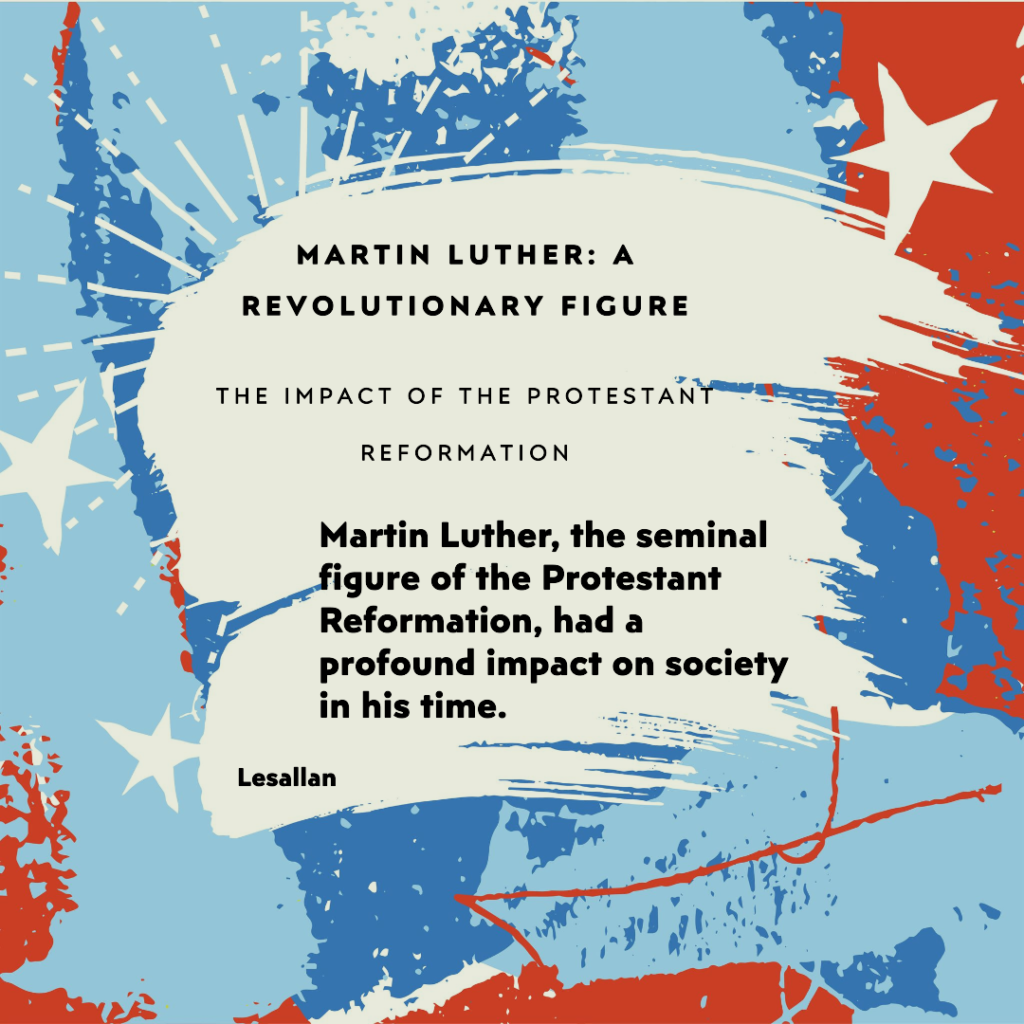Lesallan – May 15, 2024

Martin Luther, the seminal figure of the Protestant Reformation, had a profound impact on society in his time. His views on society, often articulated through his writings and speeches, were revolutionary and challenged the status quo of the 16th century.
Luther’s critique of society was multifaceted. He is famously quoted as saying, “God does not need your good works, but your neighbor does.” This statement encapsulates his belief that actions should be directed toward the betterment of one’s community rather than merely to appease a higher power. It was a call to social action, emphasizing the importance of supporting and uplifting one’s fellow human beings.
Another notable quote from Luther is, “I would advise no one to send his child where the Holy Scriptures are not supreme. Every institution that does not unceasingly pursue the study of God’s word becomes corrupt.” Here, Luther underscores the importance he placed on scripture and its role in education and society. He believed that without a foundation in religious teachings, institutions and individuals could easily lose their way.
Luther also addressed the issue of labor and vocation, asserting that all professions have dignity and are a means to serve society. He said, “The whole being of any Christian is faith and love. Faith brings the person to God, love brings the person to people.” This reflects his view that faith should translate into loving actions towards others, bridging the gap between spiritual beliefs and societal duties.
His defiance of the Catholic Church’s authority is perhaps one of his most well-known societal critiques. He famously stated at the Diet of Worms, “Unless I am convicted by Scripture and plain reason—I do not accept the authority of popes and councils, for they have contradicted each other—my conscience is captive to the Word of God. I cannot and will not recant anything, for to go against conscience is neither right nor safe.” This bold declaration was not just a religious stance but also a societal one, advocating for the freedom of conscience against institutional pressures.
Luther’s societal views were radical for his time and contributed to significant changes in the church, governance, and society at large. His emphasis on individual conscience, the importance of scripture, and the value of every vocation laid the groundwork for modern concepts of personal freedom and responsibility.
These quotes and ideas from Martin Luther continue to resonate today, reminding us of the power of individual conviction and the importance of societal reform. They serve as a testament to Luther’s enduring influence on how we view our roles within society and the broader world.
Martin Luther, the 16th-century German theologian and a key figure in the Protestant Reformation had several notable quotes related to society and faith. Here are a few:
“Unless I am convicted by Scripture and plain reason—I do not accept the authority of popes and councils, for they have contradicted each other—my conscience is captive to the Word of God. I cannot and will not recant anything, for to go against conscience is neither right nor safe. Here I stand, I cannot do otherwise. God help me. Amen.” This powerful statement was made during his defense of his doctrines at the Diet of Worms in 1521.
“God does not need your good works, but your neighbor does.” Luther emphasized the importance of love and service to others as an expression of faith.
“From the beginning of my Reformation, I have asked God to send me neither dreams, nor visions, nor angels, but to give me the right understanding of His Word, the Holy Scriptures; for as long as I have God’s Word, I know that I am walking in His way and that I shall not fall into any error or delusion.” Luther valued the study of Scripture and its role in guiding believers.
“A Christian is never in a state of completion but always in a process of becoming.” This quote encapsulates Luther’s belief that faith is not a static state but a dynamic and transformative journey.
“You are not only responsible for what you say, but also for what you do not say,” Luther emphasized the importance of speaking up for justice and truth.
These quotes not only shed light on Luther’s perspective on faith, conscience, and societal responsibility at the time, but also underline the profound impact he had on shaping education, literacy, and political boundaries. His influence was truly monumental.
Amen and Blessings,
Lesallan


